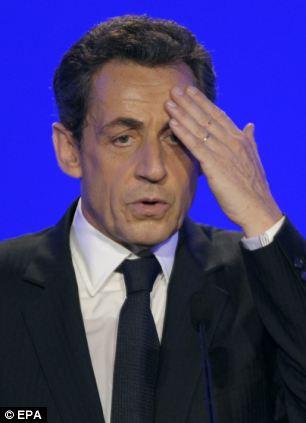Submitted by ICConline on
From 2007, France had a president, Nicolas Sarkozy, whose arrogance and stupidity knew no limits. His open love of money, his violent tirades against the young people of the poor suburbs and the immigrants, his provocations, his propensity for talking about nothing but himself...all this and more created a very strong feeling of exasperation throughout the population. It was thus no great surprise that the presidential elections ended in his defeat. His replacement, the ‘socialist’ François Hollande, relied almost exclusively on this anti-Sarkozyism to win. Prudently avoiding any promises of a bright tomorrow, even giving to understand that austerity (renamed ‘control of the budget’ or ‘reduction of the deficit’) would be a major axis of his government’s policy, Hollande was happy to present himself as a ‘normal’ president, one who would avoid pointless provocation and bad taste.
This said, it would be a serious error to see this change of colour as no more than the rejection of a particular character, however unpleasant. And it would be even more of an error to hope for a fairer and more just policy now that the left is at the head of the government.
You only have to glance beyond the frontiers of France to see that. Throughout Europe in the last few months, when elections have taken place, the team in power has been replaced, whether it is of the right or the left. In Greece, Portugal, Ireland, Spain, Italy, Finland, Slovenia, Slovakia...all the governments have been ejected. Why? Quite simply because since 2007 and the severe aggravation of the world economic crisis, all governments have been carrying out the same policy of ‘sacrifices’. There is no difference between right and left, except perhaps in the language they use, the colour of the wrapping paper around their packet of ‘reforms’. In Greece, Portugal, and Spain, from 2007 to 2011, the ‘socialists’ in power beat up on the workers, whether at work or unemployed, retired or still at university. Month after month they imposed increasingly drastic measures, endless attacks on their living standards.
But there is a second point in common in all these changes in government teams. The team that came in didn’t get a honeymoon period. Straight away they pushed through brutal austerity policies and straight away faced social discontent. The economic crisis is not a choice for capital, it is something imposed on it. It is the fruit of a world system which is sick, obsolete. Capitalism today is in decline like slavery in the decadence of the Roman empire or the feudal system in the days of absolute monarchy. The ‘debt crisis’ is only a symptom of this. All those who get elected to parliament, whatever their political party or their country, have to follow the same orientation: reduce the deficit, avoid bankruptcy by pitilessly attacking living and working conditions. The very socialist Monsieur Hollande will be no different.
Elections organised by the state are just a moment when the ‘citizens’ choose who’s going to manage the interests of capital. They are entirely inside the system. But today, to put an end to growing poverty for the world’s population, there is only one way to go: the struggle for revolution. Capitalism, this inhuman, mortally ill system, has to be replaced by a world without classes, exploitation, profit and competition. Such a world can only be built by the masses, the masses of employees, unemployed, retired, young people in part time work, united in the struggle. If votes are to be used to really change things, it will be the votes organised by us, the exploited – the votes taken in general assemblies where we decide together, collectively, how we should struggle against the state and its representatives.
Pawel 6/5/12







 del.icio.us
del.icio.us Digg
Digg Newskicks
Newskicks Ping This!
Ping This! Favorite on Technorati
Favorite on Technorati Blinklist
Blinklist Furl
Furl Mister Wong
Mister Wong Mixx
Mixx Newsvine
Newsvine StumbleUpon
StumbleUpon Viadeo
Viadeo Icerocket
Icerocket Yahoo
Yahoo identi.ca
identi.ca Google+
Google+ Reddit
Reddit SlashDot
SlashDot Twitter
Twitter Box
Box Diigo
Diigo Facebook
Facebook Google
Google LinkedIn
LinkedIn MySpace
MySpace